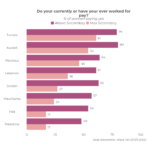What happened to citizens’ support for democracy after the Arab Uprisings? Did the support increase, stay the same, or actually decrease after all the protests, regime changes, and reforms? Which theories of citizens’ political attitudes best explain these dynamics? Analysing two waves of the Arab Barometer surveys and employing an item-response method that offers methodological improvements compared to previous studies, this article finds that support for democracy actually decreased in countries that successfully overthrew their dictators during the Uprisings. Following the arguments that emphasize the rational evaluations of citizens, it argues that in countries that had an experience with a freer political system, such as Egypt, Tunisia, and Yemen, challenges of democratization and the poor political and economic performances of the governments left citizens disappointed. Despite the hopes that people had at the onset of the Uprisings, the disappointments generated by the unmet expectations eventually led to a decline in support for democracy.
View External SiteTopics
- Charity2
- Corruption113
- COVID-1969
- Democracy35
- Discrimination13
- Economy225
- Education51
- Environment36
- Extremism19
- Freedoms50
- Gender Issues159
- Governance253
- Health44
- International Relations192
- Labor Market34
- Media31
- Migration63
- Political Institutions213
- Political Participation33
- Political Systems60
- Refugees6
- Religion118
- Security31
- Social Justice44
- Wellbeing2
- Youth75


